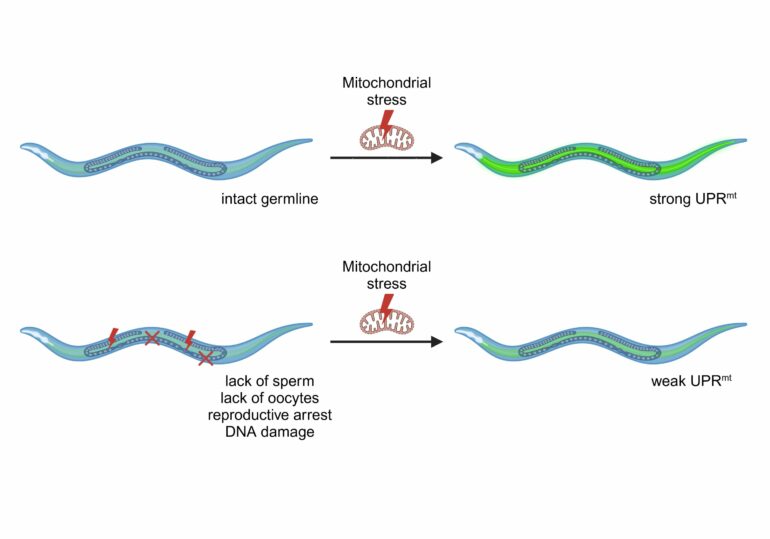Research at the Institute of Molecular Biology and Biotechnology (IMBB) of the Foundation for Research and Technology-Hellas (FORTH) and at the University of Cologne, published in Cell Reports, reveals that germline reproductive signals impact the ability of somatic tissues to induce the mitochondrial unfolded protein response (UPRmt).
IMBB researchers Dr. Nikolaos Charmpilas (now Postdoctoral Researcher at the University of Cologne, Germany), Dr. Aggeliki Sotiriou, and Konstantinos Axarlis, led by Dr. Nektarios Tavernarakis (Professor at the Medical School of the University of Crete, and Chairman of the Board of Directors at FORTH) and Dr. Thorsten Hoppe (Professor at the University of Cologne, Germany), demonstrate that a functional reproductive germline is essential for the full-scale organismal response to mitochondrial stress.
The mitochondrial unfolded protein response (UPRmt) is a critical stress response pathway activated when the mitochondrial protein folding environment is challenged, playing a fundamental role in maintaining cellular and organismal homeostasis. The researchers performed an extensive genetic analysis leveraging the genetic toolkit of the simple model organism Caenorhabditis elegans.
They showed that mutant nematodes lacking stem cells, sperm, or oocytes, are unable to respond to various genetic or chemical UPRmt inducers. Further investigation revealed that reproductive signals, rather than germline stem cells, are crucial for somatic UPRmt induction. Hence, somatic cells retain the ability to induce UPRmt as long as the organism is reproductively active, producing viable offspring.
They also uncovered the sexually dimorphic nature of UPRmt, demonstrating that male nematodes are inherently UPRmt-nonresponsive.
Finally, they showed that mitochondrial stress in the immortal germline tissue can activate UPRmt in the soma, establishing a novel germline-to-soma communication paradigm. This mechanism likely acts as a defense strategy to protect the somatic mitochondria of reproductively active adults from stress.
The germline maintains UPRmt inducibility in the gut, which in turn supports the germline through the synthesis and secretion of yolk, thereby providing nutrients to developing embryos.
These findings link the organismal response to mitochondrial stress with the reproductive status of the organism, and highlight that the decline in reproductive capacity is a primary cause of proteostasis collapse along aging.
Understanding the connection between reproductive signals and mitochondrial stress responses may lead to novel interventions to preserve proteome integrity in aging populations and mitigate age-related diseases.
More information:
Nikolaos Charmpilas et al, Reproductive regulation of the mitochondrial stress response in Caenorhabditis elegans, Cell Reports (2024). DOI: 10.1016/j.celrep.2024.114336
Provided by
Foundation for Research and Technology – Hellas
Citation:
New study uncovers a link between reproduction and a key mitochondrial stress response (2024, June 17)



